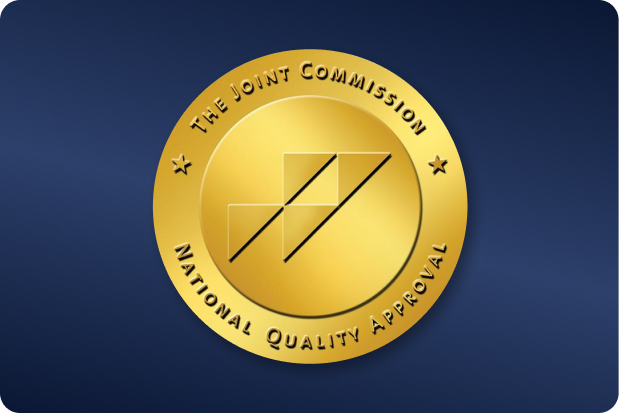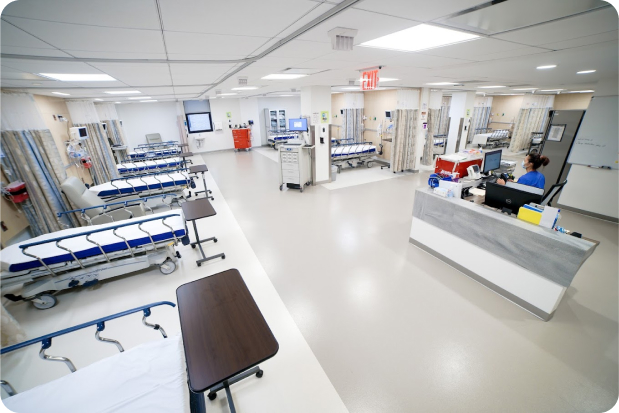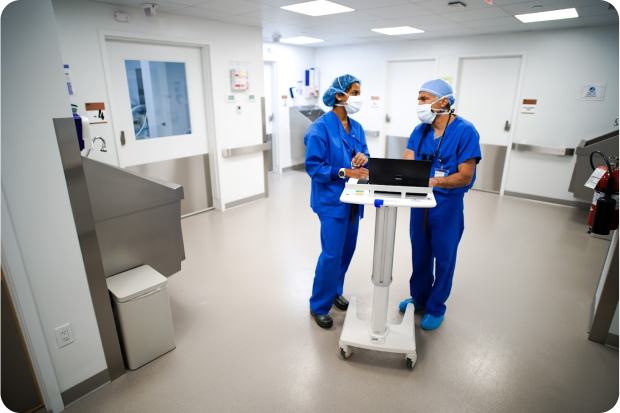 Same-day Appointments Book Online
Call to book 201.523.9590
Same-day Appointments Book Online
Call to book 201.523.9590
 Same-day Appointments Book Online
Call to book 201.523.9590
Same-day Appointments Book Online
Call to book 201.523.9590
Table of contents
Lumbar radiculopathy usually is a condition that occurs after you’ve had lower back pain for a while. By ignoring the initial symptoms that caused your discomfort, you risk developing this painful pinched nerve condition. Don’t hesitate to call on the spine doctors at the Spine & Rehab Group for a complete exam when back pain begins. And if you do need treatment for lumbar radiculopathy or surgery for lumbar radiculopathy, you’re in the best hands.
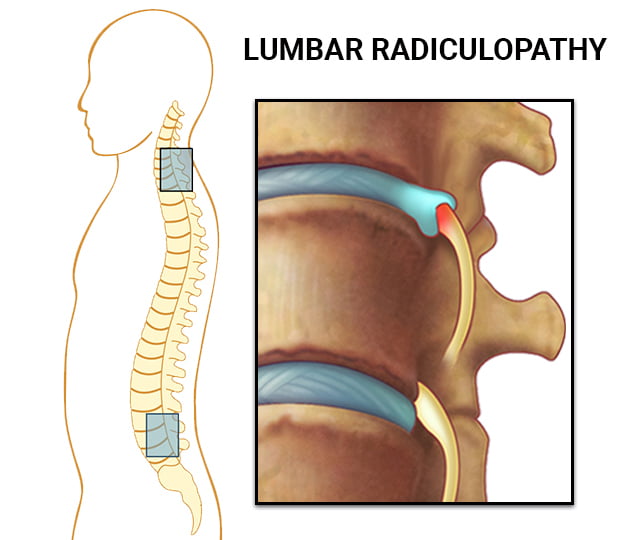
Lumbar radiculopathy describes a range of symptoms that occur due to compression or inflammation of a lumbar spinal nerve root exiting the spine at levels L1 to S4. The lower back is highly mobile and any changes in the structure can cause referred pain and other symptoms. Millions of people struggle with back pain and leg pain because of such spinal conditions.
The symptoms affect your quality of life by inhibiting your capacity to do daily tasks. Damage to any part of the lumbar spine can lead to sudden structural changes, causing compression of the spinal nerve roots. This leads to symptoms of lumbar radiculopathy.
Effective lumbar radiculopathy treatment depends on an early and correct diagnosis. Dr. Amr Hosny and the highly trained spine specialists at the Spine & Rehab Group in New York City and northern New Jersey use the latest technology to diagnose the point of your pain. Then they can offer effective treatment.
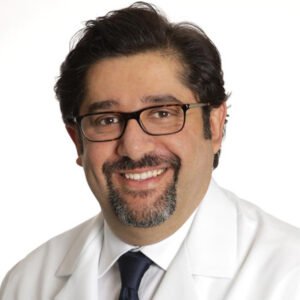 Amr Hosny, MD, MBA, FASA
Book Now
Amr Hosny, MD, MBA, FASA
Book Now
 David Chu, MD, FAAPMR
Book Now
David Chu, MD, FAAPMR
Book Now
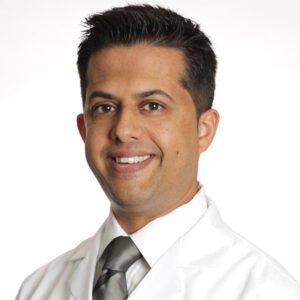 Vivek Mehta, MD, FAAPMR
Book Now
Vivek Mehta, MD, FAAPMR
Book Now
 Deepali Gupta, MD, DABA, DABPM
Book Now
Deepali Gupta, MD, DABA, DABPM
Book Now


Due to age, disease or injury, conditions develop in your lumbar spine that cause lower back pain and other symptoms. Lumbar radiculopathy develops if these conditions aren’t treated promptly, and you end up with compression or irritation of your spinal nerves in the lumbar spine.
Some spinal conditions that can lead to radiculopathy in the lumbar spine include:
Any activities that exert significant and sustained pressure on your lower back put you at risk of lumbar radiculopathy. Some people are more susceptible to the condition than others.
Factors that make you more vulnerable to lumbar radiculopathy include:
Symptoms of lumbar radiculopathy vary, depending on the location of the nerve roots that have been compressed. If you experience regular lower back discomfort or persistent sciatica pain, look for symptoms of lumbar radiculopathy. Consult with a spine doctor like Dr. Hosny for diagnosis and treatment at the first sign of lower back pain.
Symptoms of lumbar radiculopathy include:
In some cases, you won’t feel any pain accompanying lumbar radiculopathy, but you may experience flare-ups. This is why you need a diagnosis that allows for immediate treatment to avoid further damage to the nerve roots. If you ignore the problem or mask the pain, your condition likely worsens over time.
I've been dealing with lower back pain for months and it hasn't gotten better. I called The Spine and Rehab Group for help and was glad that I did. After my consultation, my lower back pain is better. Dr. Hosny was amazing!
Vernie W. ★★★★★I came to the spine and rehab group for my back and leg pain. I was able to get an appointment the same day I called. The staff was very friendly and courteous. The doctors were very knowledgeable and took time to explain what was causing my pain and answer all my questions. I felt comfortable having my procedure done in their state of the art surgery center, where the staff made you feel at ease. They are very easy to reach and available to answer all your questions.
Garry B.Your spine specialist finds the best radiculopathy lumbar region treatment based on the examination and diagnostic results. Interventional treatment aims to reduce pain, restore full function of your lower back and offer a permanent solution to the pain and discomfort.
Lumbar radiculopathy treatments may include:
The expert spine doctors at the Spine & Rehab Group recommend the most conservative treatment for radiculopathy after a thorough examination of your case. They use on surgery only when they’ve tried all other options. If you have lower back pain and other symptoms of lumbar radiculopathy, contact the spine specialists at one of their eight New York City and northern New Jersey locations for the most effective treatment for lumbar radiculopathy.
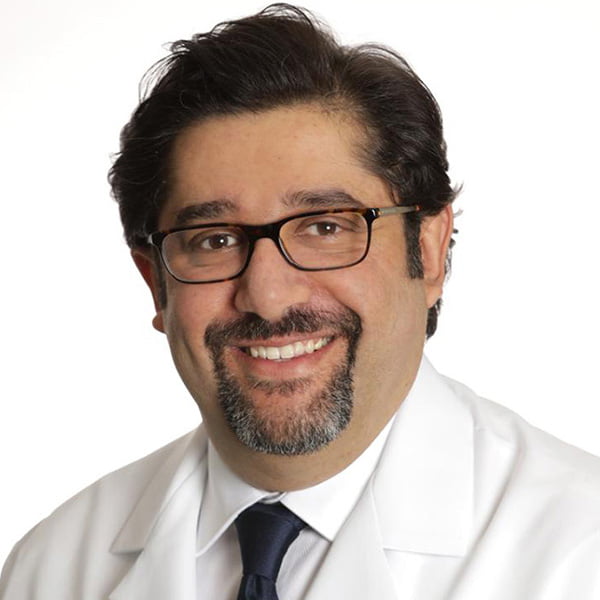
Dr. Hosny is a distinguished physician, educator, and healthcare leader with a commitment to advancing health equity and accessibility in the rapidly evolving landscape of modern healthcare. After completing his residency at St. Luke's Roosevelt Hospital Center, affiliated with Columbia University in New York City, he pursued an Interventional Spine Fellowship at Beth Israel Deaconess Medical Center, part of Harvard Medical School in Boston, MA.
Dr. Hosny has held prominent roles in academic medicine, including serving as an Associate Clinical Professor at New York Medical College and as the Interventional Spine Fellowship Program Director. These positions reflect his dedication to mentoring the next generation of healthcare professionals and advancing the field of interventional spine care.
More About Dr. HosnyThe Spine & Rehab Group
140 NJ-17,
Paramus, NJ 07652
(212) 242-8160
